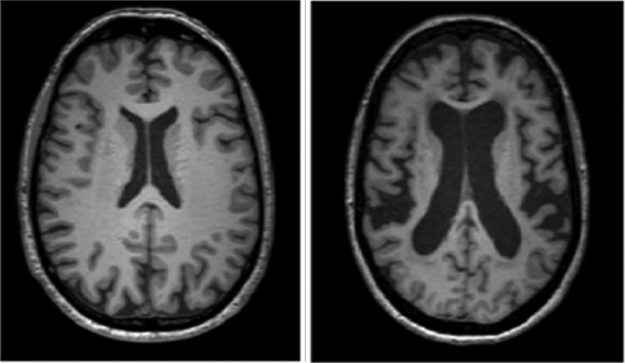This post is also available in Dutch.
Wisdom comes with old age but, unfortunately, it also brings shortcomings: you’re more forgetful and it takes longer to learn something new. The aging of the brain is caused by shrinking of the brain, reduced blood flow, and so-called microcerebral haemorrhages. Even though you can’t do much about it, there are fortunately a few things you can do to slow this decline.
The brain is shrinking
As you age, the volume of your brain decreases (see the image below). One of the main causes is that the cells of the brain shrink and the number of connections between brain cells decreases. Because of this, brain cells are less able to communicate with each other.
Interestingly enough, this process is quicker in some brain areas presumably because they are more susceptible to heart and vascular diseases, like high blood pressure and elevated cholesterol. One important brain region where the shrinkage is faster is the hippocampus, important for memory. This can cause you to become more forgetful. Also, the prefrontal cortex, the most frontal part of your brain, appears to be more susceptible to aging. This can cause you to be slower in thinking and understanding and to have a more difficult time with certain tasks, such as planning and concentrating.

Reduced blood flow in the brain
Another important aspect of aging is that blood flow in the brain decreases. This is likely to have multiple causes, like a reduction of blood vessels via heart and vascular diseases or inflammations caused by stress or disease. The blood transports oxygen to the brain. Our brains use 20% of all our oxygen and, as you can imagine, they work less well if aging reduces the blood flow.
Microcerebral haemorrhages and infarcts
Lastly, a lot of people suffer from so-called microcerebral haemorrhages or infarcts (blood vessel obstruction). This might sound bad, but it is a normal part of aging. You don’t notice any of them and that is why they are also called ‘silent’ bleeding or infarcts; they are so small that they are unnoticeable. However, together with decreased blood flow, these events cause even more aging in the brain.
How do you slow down aging?
Even though this all sounds very depressing, these changes are part of natural aging; they are supposed to happen. There is also some good news: you can influence the speed of aging, at least in part. Aging of the brain can be accelerated by stress, smoking, alcohol, and an unhealthful diet. Instead, moving slows down brain aging: The brains of people who move more have improved blood flow and their thinking capacity remains stable. Being more socially active also keeps the connections between brain cells intact. The sooner you start with this, the better! If you want to delay the expiration date of your brain, then better grab your walking boots!
Do you want to participate in research and prevent your own brain from aging?
At the Donders Institute, we are looking for participants between 60 and 75 years of age. For more information, visit the websites of the HELI study and the COMBI study.
Credits
Author: Judith Scholing
Buddy: Marlijn ter Bekke
Editor: Felix Klaassen
Translation: Wessel Hieselaar
Editor translation: Christienne Damatac
Image from Mikhail Nilov via Pexels
